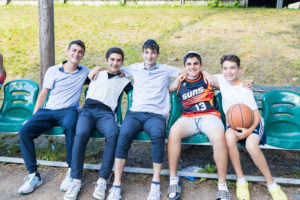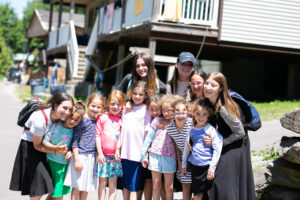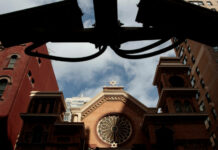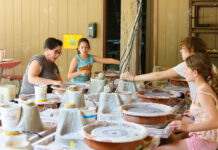The Tree of Life synagogue complex shooting in Pittsburgh, the deadliest attack on Jews in American history, is now almost four years old. Each year, it seems, the Anti-Defamation League reports a new record for antisemitic incidents, with the 2021 number of more than 2,700 exceeding the 2020 total by 34%.
It’s been well-documented that in this environment, synagogues locally and nationally are adding security layers, like guards outside of services. The Jewish Federations of North America even made security a $54 million priority in 2021 with a new grant program to local Jewish Federations and institutions.
Now though, the need for security is reaching the perennial oasis of Jewish childhood: overnight camp.

On June 30, Teach Coalition, an education nonprofit affiliated with the national Orthodox Union, announced a new security initiative for sleepaway camps in its Pennsylvania network. The Teach Coalition Summer Camp Network is a group of PA camps that will collaborate on security efforts, according to a press release from Teach Coalition. The group includes several Pocono-based operations like Camp Ramah and Camp Morasha and represents more than 4,000 campers.
Its first big effort was landing $1 million in grant money from Pennsylvania’s Nonprofit Security Grant Fund Program. Camps in the network are already putting those dollars to use.
“Teach is no longer looking out for you and your children just from September to June,” said Arielle Frankston-Morris, the executive director of Teach PA, in the press release. “We are taking care of them in the summer too.”
But what does that entail? Jeremy Joszef, the director of Camp Morasha in Lakewood, was kind enough to explain his operation’s new security layout to the Jewish Exponent.
Morasha is an Orthodox camp with about 1,300 campers and 500 staff members. Joszef, 37, is in his 11th year as director. Using money from the grant program, the Pocono operation spent $200,000 on security cameras, lighting, a security barrier and an armed guard.
“It’s like a mini city here,” Joszef said.
Cameras
Morasha officials installed security cameras both inside and outside of camp.
As the director explains, cameras serve a dual purpose. Externally, they monitor who is entering camp and who is leaving. Internally, “we need to make sure everybody is staying safe,” he said.
Lighting
Before camp officials added light posts and lights all over the property, the Lakewood grounds were dark at night. Now though, Morasha at night is like a neighborhood in a suburb.
There’s enough light to make things visible and to make everybody feel safe. By the entrance, it’s also now possible to see people and cars coming in and going out.
A Security Barrier
Since Morasha is situated along a main road, officials want to deter unknown outsiders from gaining access to the grounds.
A new landscape barrier on the perimeter of the property prevents people from seeing into the camp, according to Joszef. The barrier is necessary to protect what is to a large degree an outdoor operation.
“It’s not like a school where it’s easy to enclose,” he said.
A 24-Hour Armed Guard
Cameras and lights allow camp leaders to see what is going on. Those two and the barrier can also act as deterrents. But they couldn’t do the responding if a security situation were to arise.

At the same time, neither could the local police department because there is none.
Lakewood is a village with a population in the hundreds. The nearest police department is 40 minutes away, according to Joszef.
“If there’s a security emergency at camp, we can’t afford to wait 40 minutes,” he said.
So instead, the camp created its own police force. A 24-hour armed guard position is manned by a few different locals on rotation. It is an official camp position.
“They are patrolling 24/7,” said Joszef.
But while security is a feeling of safety as much as safety itself, the director still needs to try to maintain the blissful feeling that often defines a camp summer. He believes one guard is enough.
“We’re not going to have an armed guard every five feet in this camp,” the director explained. “It would scare the kids.”
But even Joszef acknowledged that kids today are already used to making security considerations in their everyday lives. In schools, “active shooter drills have become as common as fire drills,” he said. Now something similar is common in camp, too.
While Morasha leaders try not to be too specific, they do teach campers how to react in case of emergency. As Joszef explains it, kids know that if this happens, this is where you go and how you communicate.
“We relay to them what they need to know but not in a way that will create fear,” he said. JE






